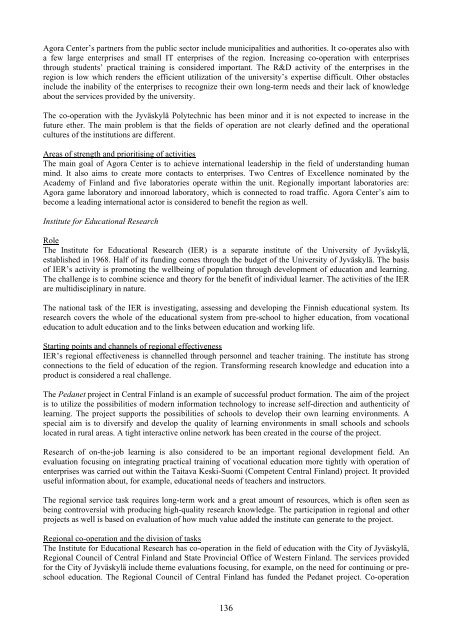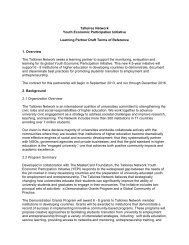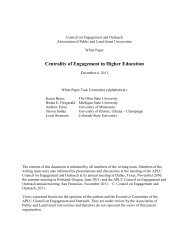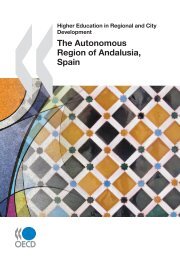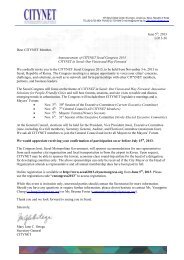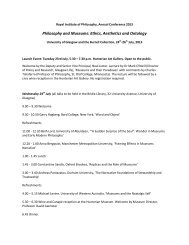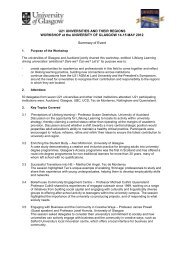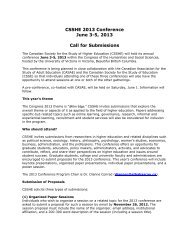Finland - Jyvaskyla Region - Final Self-Evaluation Report.pdf
Finland - Jyvaskyla Region - Final Self-Evaluation Report.pdf
Finland - Jyvaskyla Region - Final Self-Evaluation Report.pdf
You also want an ePaper? Increase the reach of your titles
YUMPU automatically turns print PDFs into web optimized ePapers that Google loves.
Agora Center’s partners from the public sector include municipalities and authorities. It co-operates also witha few large enterprises and small IT enterprises of the region. Increasing co-operation with enterprisesthrough students’ practical training is considered important. The R&D activity of the enterprises in theregion is low which renders the efficient utilization of the university’s expertise difficult. Other obstaclesinclude the inability of the enterprises to recognize their own long-term needs and their lack of knowledgeabout the services provided by the university.The co-operation with the Jyväskylä Polytechnic has been minor and it is not expected to increase in thefuture ether. The main problem is that the fields of operation are not clearly defined and the operationalcultures of the institutions are different.Areas of strength and prioritising of activitiesThe main goal of Agora Center is to achieve international leadership in the field of understanding humanmind. It also aims to create more contacts to enterprises. Two Centres of Excellence nominated by theAcademy of <strong>Finland</strong> and five laboratories operate within the unit. <strong>Region</strong>ally important laboratories are:Agora game laboratory and innoroad laboratory, which is connected to road traffic. Agora Center’s aim tobecome a leading international actor is considered to benefit the region as well.Institute for Educational ResearchRoleThe Institute for Educational Research (IER) is a separate institute of the University of Jyväskylä,established in 1968. Half of its funding comes through the budget of the University of Jyväskylä. The basisof IER’s activity is promoting the wellbeing of population through development of education and learning.The challenge is to combine science and theory for the benefit of individual learner. The activities of the IERare multidisciplinary in nature.The national task of the IER is investigating, assessing and developing the Finnish educational system. Itsresearch covers the whole of the educational system from pre-school to higher education, from vocationaleducation to adult education and to the links between education and working life.Starting points and channels of regional effectivenessIER’s regional effectiveness is channelled through personnel and teacher training. The institute has strongconnections to the field of education of the region. Transforming research knowledge and education into aproduct is considered a real challenge.The Pedanet project in Central <strong>Finland</strong> is an example of successful product formation. The aim of the projectis to utilize the possibilities of modern information technology to increase self-direction and authenticity oflearning. The project supports the possibilities of schools to develop their own learning environments. Aspecial aim is to diversify and develop the quality of learning environments in small schools and schoolslocated in rural areas. A tight interactive online network has been created in the course of the project.Research of on-the-job learning is also considered to be an important regional development field. Anevaluation focusing on integrating practical training of vocational education more tightly with operation ofenterprises was carried out within the Taitava Keski-Suomi (Competent Central <strong>Finland</strong>) project. It provideduseful information about, for example, educational needs of teachers and instructors.The regional service task requires long-term work and a great amount of resources, which is often seen asbeing controversial with producing high-quality research knowledge. The participation in regional and otherprojects as well is based on evaluation of how much value added the institute can generate to the project.<strong>Region</strong>al co-operation and the division of tasksThe Institute for Educational Research has co-operation in the field of education with the City of Jyväskylä,<strong>Region</strong>al Council of Central <strong>Finland</strong> and State Provincial Office of Western <strong>Finland</strong>. The services providedfor the City of Jyväskylä include theme evaluations focusing, for example, on the need for continuing or preschooleducation. The <strong>Region</strong>al Council of Central <strong>Finland</strong> has funded the Pedanet project. Co-operation136


